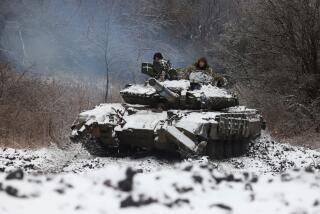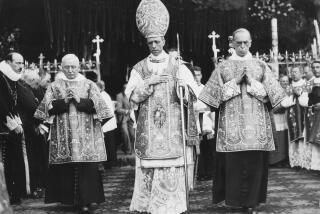Gorbachev Documents Soviet Guilt at Katyn
- Share via
MOSCOW — President Mikhail S. Gorbachev, seeking to defuse the single biggest issue poisoning relations between the Soviet Union and neighboring Poland, gave Polish President Wojciech Jaruzelski documents Friday that showed that Soviet secret police killed thousands of Polish army officers during World War II and buried them in mass graves in a Russian forest.
The dramatic admission from the Kremlin, accompanied by an expression of regret for what an official statement called “one of the gravest crimes of Stalinism,” was a clear effort by Gorbachev to shore up relations with a key Warsaw Pact nation as East Germany and other socialist countries drift further westward.
Moscow, in a statement carried by the official news agency Tass, reversed almost half a century of denials in admitting that its secret police had killed 4,000 soldiers whose bodies were found in 1940 in the Katyn Forest near Smolensk, southwest of Moscow.
The Tass statement added that another 11,000 Polish soldiers disappeared, but did not detail their fate. Historians, however, believe they also were massacred.
The victims were among about 130,000 Polish soldiers who were in the part of prewar Poland taken over by Moscow in 1939 as part of a nonaggression pact between Soviet leader Josef Stalin and Nazi Germany’s Adolf Hitler.
Stalin apparently ordered some of the troops killed because he feared that they “might in the future enter the struggle for their country’s rebirth,” according to Soviet historian Natalya Lebedeva, whose views were published last month in the progressive weekly Moscow News.
The Nazis later occupied the area around Katyn and in 1942 revealed the discovery of the mass graves. After trying to pass it off as a medieval burial site, the Soviet Union contended that the Poles had been shot by German troops in 1941.
When Poland’s government in exile in London demanded more evidence, Stalin angrily broke off ties with what he described as a “hostile” Polish leadership.
At the time, the Western countries largely ignored the massacre or accepted Stalin’s version of events. But by the 1950s, Western historians were blaming the Soviets for the killings. Moscow continued to deny that it had any role in the deaths.
Jaruzelski and Gorbachev agreed in 1987 to set up a commission to study World War II events at Katyn. In November, Polish Prime Minister Tadeusz Mazowiecki, after a visit to Katyn, demanded “moral compensation” for those who died.
In Friday’s meeting, Gorbachev gave Jaruzelski copies of documents from Soviet archives, which reportedly were only recently discovered and which dealt with Polish soldiers held in Soviet prison camps.
Tass did not report further details of the meeting, but Jaruzelski said earlier this week that he expected the two leaders would discuss the reunification of Germany and the future of Soviet troops on Polish soil. Jaruzelski is to visit Katyn today.
The dispute over Katyn damaged relations between Poland and the Soviet Union for decades. There had been speculation that Gorbachev would discuss the Katyn incident during his official visit to Poland last year, but he avoided the topic. By choosing to reveal the guilt of Soviet secret police now, Gorbachev was making an obvious overture to Warsaw.
Moscow is seriously concerned about the future of the Warsaw Pact, particularly as East Germany’s new leaders have indicated they would support a united Germany’s becoming a member of the North Atlantic Treaty Organization if the Western Alliance establishes an all-European strategic system. The Soviet Union has repeatedly said it finds that proposal unacceptable.
Gorbachev was seeking to demonstrate once again that he and his government are vastly different from any previous Soviet leaders. It was not immediately clear, however, how much good the Soviet admission would accomplish in Poland, where perceptions of Moscow are colored, perhaps irreversibly, by years of false denials regarding Katyn.
The families of the 11,000 Polish officers whose fates were not detailed by the Soviet statement, for instance, have long demanded and are still seeking a full explanation of what happened to the troops.
Moscow’s admission also answers growing calls in this country for greater Soviet forthrightness on the issue. On Sunday, for instance, the Medecinskaya Gazeta called for publication of official medical reports regarding the Katyn killings, contending that most of the victims were killed with a bullet in the back of the neck and some bore wounds produced by Soviet-made bayonets.
As part of his effort at glasnost, or greater openness, Gorbachev has sought to fill in the so-called blank spaces in Soviet history and particularly to publicly reveal the crimes of Stalin, whose bloody period of dictatorship is referred to here euphemistically as the “Cult of the Personality.”
The Kremlin statement clearly blamed the massacre on Stalin and his NKVD, the brutal forerunner of the modern KGB secret police. It singled out by name NKVD Chief Lavrenti Beria and his protege V. N. Merkulov.
“Just recently, Soviet archive workers and historians discovered some documents concerning Polish servicemen,” the Soviet statement said. “It follows from these documents that in April-May, 1940, 394 of the 15,000 or so Polish officers kept in the three camps (in Kozelsk, Starobelsk and Ostashkov) were transferred to the Gryazovetsk camp” in northern Russia.
“The larger part, however, were turned over to the NKVD administrations . . . and never mentioned in NKVD statistical accounts again,” the statement said. “The Soviet side expresses deep regret.”
More to Read
Sign up for Essential California
The most important California stories and recommendations in your inbox every morning.
You may occasionally receive promotional content from the Los Angeles Times.










